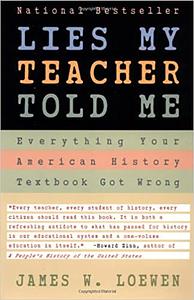Take a photo of a barcode or cover
1.04k reviews for:
Lies My Teacher Told Me: Everything Your American History Textbook Got Wrong
James W. Loewen
1.04k reviews for:
Lies My Teacher Told Me: Everything Your American History Textbook Got Wrong
James W. Loewen
The majority of this information wasn't new to me, and the tone was rather alarmist, but I like the topics (history, publishing, education, etc.) so it still managed to keep me interested. History can look vastly different when viewed through different eyes, and that is something that textbooks and schools seem to like to avoid. Instead, history is presented as a series of heroes, (with our country's liberty and independence being the greatest of all,) which might interest the younger elementary students but rings false to older students. History can be exciting if you don't make it all dry, drab, and politically correct. Leave the controversy in and see how much our students begin to absorb!
Great reading...
A good to read in conjunction with "The People's History of the United States". The last one covers the voices of the forgotten, silenced or the people who never make it to the history pages but are the ones in the middle of it. This one goes straight into what is willingly distorted, from the presenting blameless heroes to silencing anything that contradicts American Exceptionalism. A highly recommend read to understand the American psyche.
A good to read in conjunction with "The People's History of the United States". The last one covers the voices of the forgotten, silenced or the people who never make it to the history pages but are the ones in the middle of it. This one goes straight into what is willingly distorted, from the presenting blameless heroes to silencing anything that contradicts American Exceptionalism. A highly recommend read to understand the American psyche.
Wow. This needs to be on every American’s reading list! The first 2/3 of this book debunk much of what is learned/taught in America’s history classes. The final portion focuses on why this might be and how teachers can combat this. So much of what I thought to be true in American history was questioned and so much of what I never knew was explained. Also- creatively written as to engage the reader throughout. Would HIGHLY recommend this.
4.5/5
Anyone who is interested in US history must read this book. Loewen describes the problem with how high school history books and written and gives a more accurate version of US history. History will always be controversial, however we should learn from the past so that we can understand the problems we face today.
Anyone who is interested in US history must read this book. Loewen describes the problem with how high school history books and written and gives a more accurate version of US history. History will always be controversial, however we should learn from the past so that we can understand the problems we face today.
A must-read. Not much has changed for the better, even three decades later…
So, here’s what I know. I know that in high school, history was not my favorite class. I didn’t hate it. But I didn’t love it. I know I answered chapter review questions with a BiC pen in a mead spiral notebook ad nauseum. I know I thought many times that the dusty, tired old facts I memorized about events in the 1700’s or 1800’s (or anytime before 1968 for that matter) so I could pass the tests on The Civil War or The Great Depression had no impact on my life in the fast, fabulous and fantastic 1980’s. Why did I need to know this, exactly??
Here is something else I know. By the time I was parenting my own future history students, I couldn’t believe how much insight Studs Terkel’s Hard Times had given me into my parents’ childhood years in the Great Depression or how closely the story of pioneers crossing the Mississippi in covered wagons mirrored the story my grandfather told in his memoir about his parents migrating from Tennessee to Missouri because Union vs Confederate loyalties within two families had driven them apart. I could not get enough of the stories of history.
My questions are something like these:
*Why does it take so long for history to become interesting? (I am laughing just thinking about the irony of this question
Here is something else I know. By the time I was parenting my own future history students, I couldn’t believe how much insight Studs Terkel’s Hard Times had given me into my parents’ childhood years in the Great Depression or how closely the story of pioneers crossing the Mississippi in covered wagons mirrored the story my grandfather told in his memoir about his parents migrating from Tennessee to Missouri because Union vs Confederate loyalties within two families had driven them apart. I could not get enough of the stories of history.
My questions are something like these:
*Why does it take so long for history to become interesting? (I am laughing just thinking about the irony of this question
I read this book during my first semester of university teaching. It changed my approach to teaching American history.
challenging
informative
reflective
medium-paced
From other reading I’ve done, I already knew a lot of the information in this book. But it’s still a well-written explanation for why most history classes in America are awful.
informative
inspiring
medium-paced


